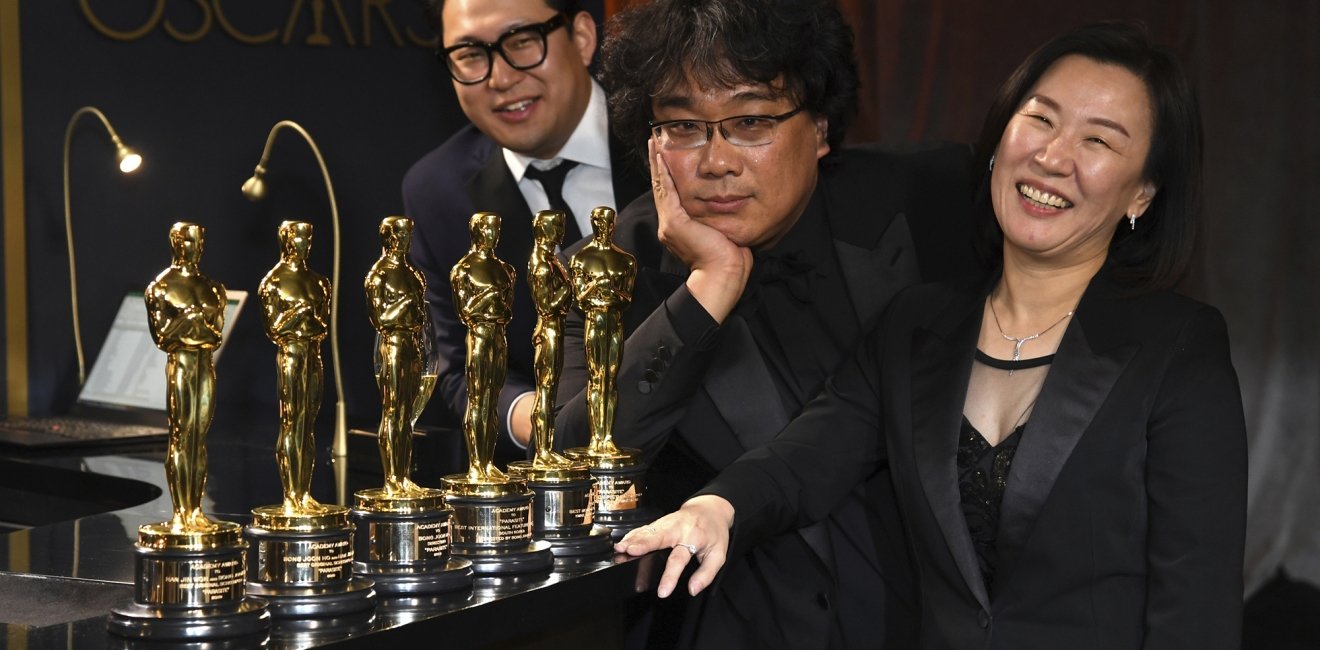
A blog of the Indo-Pacific Program
For the first time in Academy Awards history, a South Korean film, Parasite, was nominated for Best Picture in 2020. I didn’t want to jinx it by organizing or attending an Oscars viewing party. The odds were against Parasite, after all: Never before in the Academy’s 92-year history had a non-English-language film won Best Picture. So I watched from home while doing the dishes.
By the end of the evening, I wished I were out with Korean friends, drinking soju and gobbling down instant ramen noodles. How fatalistically Korean of me to assume the worst by staying in on the biggest night in history for Korean cinema: That little subtitled sleeper movie from Seoul defied the odds and won. Four times.
And in the process, Parasite made Oscar history: First South Korean feature film to win an Academy Award. First non-English-language film to win Best Picture. Director Bong Joon-ho made his own history: He tied the legendary Walt Disney’s record for most Oscar wins in one season with his four statuettes, an amazing feat for a Hollywood outsider. His response: “I’m ready to drink tonight — until next morning.” How I wish I were at karaoke with the Parasite cast.
I’m not South Korean. But regardless of citizenship, I suspect every ethnic Korean is celebrating this win, from the great Korean-Canadian actor Sandra Oh to elites with internet access in North Korea. And it’s not just Koreans: Cinephiles around the world were rooting for this film because, simply put, its stellar filmmaking.
When asked why Parasite has captured our imaginations, I cite the moviemaking first.
The script is clever and comic, hilarious and dark, a true masterpiece of screenwriting. Watching Parasite a second time, I spotted nuances in the writing that I missed the first time, the subtle layering of references designed to engage our subconscious. The plot twists are unexpected and gripping; Parasite starts out as a comedy and then veers wildly into horror. The set and cinematography are stunning, from the tableau of the rich family’s sunlit mansion and verdant lawn to the cramped, dank, artificially lit underground spaces that the working-class families inhabit.
Each character is written and acted to be likeable even as they are flawed, and each actor avoids lapsing into slapstick and caricature even as the film takes a turn into black comedy.
There is the acting. Parasite has been praised as a paragon of ensemble acting, rightly so. Each character is written and acted to be likeable even as they are flawed, and each actor avoids lapsing into slapstick and caricature even as the film takes a turn into black comedy. Song Kang-ho, who plays Mr. Kim, deserves special mention, and not just because he is one of South Korea’s most famous actors. He played the role as a kind of everyman - but for the flickering rebellion on his face that hinted at a hidden rage.
And then there is the directing. Bong Joon-ho’s Best Director win was not a fluke. It was the culmination (or perhaps the start) that was decades in the making, not only for Bong as a director who has meticulously and assiduously cultivated his craft but also for Bong as a South Korean. And this is precisely why these wins are so meaningful to South Koreans.
South Korea is the darling of Asia, often cited as the world’s “most wired” nation for its high-tech connectedness, its Samsung and LG smartphones. It’s beloved across Asia for the beauty, glamour and modernity that Seoul projects in TV dramas.
We sometimes forget that South Korea was until fairly recently a war torn, developing country struggling with oppression from military dictators and overshadowed by the nuclear threat posed by North Korea. In the early 1970s, its GDP per capita was lower than that of North Korea. Today, South Korea has the world’s 12th-largest economy. It’s not uncommon to see glossy Benzes and Mini Coopers like those in Parasite. But I still recall the South Korea of the 1980s, when we brought suitcases full of instant coffee for relatives who had no access to foreign products.
To be honest, the “miracle on the Han,” as Seoul is often called, did not catapult everyone into prosperity. While a growing upper middle class basks in worldly materialism, the working class continues to struggle to put food on the table (or connect to the internet). Unemployment and rising housing costs are major concerns for everyday South Koreans, far bigger worries, frankly, than North Korea. As the ultra-rich get richer, the poor get poorer — a consequence of capitalism that we see around the world, and a scenario that many can relate to.
I experienced this disparity firsthand living in Seoul as a journalist. For the first eight years as an AP bureau chief, I lived in an expat bubble, in a “villa” in a neighborhood that caters to expats and wealthy South Koreans. I had no idea of the poverty that lay just over the hill — until I bought property in Bogwang-dong and moved into a unit, alongside basement dwellers like those portrayed in Parasite. In 2015, Bong himself took the New York Times to the gritty, salty neighborhood, saying: “I have to shoot something here before something destroys it.”
South Korean filmmakers and artists have been pressured over the decades to portray their country and government in a positive light.
This is a side of South Korea that past governments would not have wanted its filmmakers to portray. South Korean filmmakers and artists have been pressured over the decades to portray their country and government in a positive light, as evidenced by the revelation of cultural blacklists designed to punish artists who did not step into line — including Bong and Parasite star Song Kang-ho.
Bong’s generation is different. He came of age just as South Korea was making the transition to the First World and as the internet brought the world to Seoul. His influences are broad and worldly, and his movies reveal a newfound sense of empowerment and independence as a South Korean. He made a South Korean film, set in South Korea, touching on South Korean issues — but informed by techniques and inspiration gleaned from influences around the world. I’m in awe of his vision — and his strength of mind in casting aside conformism to make a film that risked the disapproval of those who seek to portray South Korea in only a positive light.
Rewarding Bong’s singular vision, one that paid homage to Hollywood’s filmmaking royalty but did not mimic or pander to Hollywood or mainstream America, should inspire the next generation of artists — in South Korea and elsewhere. “Probably the reason why I was excited was because this could be the start of a new era for the South Korean film industry — and a stepping stone for more international films around the world to be spotlighted,” says Jihan Kim, one of our Wilson Center interns from Seoul. The win was a bright moment for diversity at a time when Hollywood is facing accusations of #OscarsSoWhite.
And for South Koreans, it’s their moment to step into the spotlight. For years, as a journalist, I struggled to get South Korea stories on the front page; all the attention was focused on North Korea, the dramatic twin on the other side of the DMZ. Slowly but steadily, South Korea has found its niche in another arena: pop culture. Thanks to BTS and Bong, South Korea has exploded onto the front pages — and it’s about time.
______
Jean H. Lee is director of the Hyundai Motor-Korea Foundation Center for Korean History and Public Policy at the Wilson Center and a former AP bureau chief in Seoul and Pyongyang. Follow her on Twitter and Instagram @newsjean.
The views expressed are the author's alone, and do not represent the views of the U.S. Government or the Wilson Center. Copyright 2020, Asia Program. All rights reserved.
Author

Journalist and former Pyongyang Bureau Chief, Associated Press

Hyundai Motor-Korea Foundation Center for Korean History and Public Policy
The Center for Korean History and Public Policy was established in 2015 with the generous support of the Hyundai Motor Company and the Korea Foundation to provide a coherent, long-term platform for improving historical understanding of Korea and informing the public policy debate on the Korean peninsula in the United States and beyond. Read more


Indo-Pacific Program
The Indo-Pacific Program promotes policy debate and intellectual discussions on US interests in the Asia-Pacific as well as political, economic, security, and social issues relating to the world’s most populous and economically dynamic region. Read more





